Key words: Lost, TV series, mystery, time, flashback, fast forward
The TV serial Lost is built on mystery. The nature of this mystery, however, seems qualitatively different from more traditional enigmas due to the complex relationships arising from the interaction of three different temporal planes: past, present and future.
No, I don’t watch much TV. However, I’ve become quite fond of the series Lost (2004-onwards). I’ve devoured the three first seasons in a few months and I’m still deeply engaged during this fourth season. I’m anything but an exception; most of the people I know have become equally addicted to the series. Are we so conventional then, or is there really something about this TV show?
 I’ve always seen the series as the hyperbole of mystery. Mystery is a narrative strategy; a fine strategy to hook the audience to a story. More specifically, a mystery is an enigma, an unresolved question, a puzzling and incomprehensible thing, something whose meaning and reality is hidden from us [1]. From the very first chapter, Lost begins overwhelming the viewer with questions. Every single element in the story gives rise to an increasing number of enigmas; and, whenever an answer arrives, it comes along with more and more perplexing questions.
I’ve always seen the series as the hyperbole of mystery. Mystery is a narrative strategy; a fine strategy to hook the audience to a story. More specifically, a mystery is an enigma, an unresolved question, a puzzling and incomprehensible thing, something whose meaning and reality is hidden from us [1]. From the very first chapter, Lost begins overwhelming the viewer with questions. Every single element in the story gives rise to an increasing number of enigmas; and, whenever an answer arrives, it comes along with more and more perplexing questions.
For instance, when the veil on the nature of the hatch was finally lifted at the beginning of the second season, this new knowledge came together with a plethora of new enigmas: Why was the hatch inhabited? How did these other people arrive on the island? How long have they been there? Why didn’t they go outside? What was their function? What would happen if they didn’t comply with their obligations? Who did they work for? And so...
 This hyperbolic nature of mystery in Lost, however, is not based on mere accumulation. It’s not only adding one enigma over the other. In fact, the structure of mystery in the series is a bit more complex. What I’ve found particularly interesting is the different levels on which the enigmas work. During the first seasons, the enigmas in Lost worked on two different planes: the present and the past. Questions and doubts not only arose regarding the events on the island, but also about events prior to the plane crash. Here it is important to notice that the past in Lost is not inferred through present actions and dialogue, but concrete, and brought forward through the regular use of flashbacks.
This hyperbolic nature of mystery in Lost, however, is not based on mere accumulation. It’s not only adding one enigma over the other. In fact, the structure of mystery in the series is a bit more complex. What I’ve found particularly interesting is the different levels on which the enigmas work. During the first seasons, the enigmas in Lost worked on two different planes: the present and the past. Questions and doubts not only arose regarding the events on the island, but also about events prior to the plane crash. Here it is important to notice that the past in Lost is not inferred through present actions and dialogue, but concrete, and brought forward through the regular use of flashbacks.
To the question “what is happening?” it is added the one “what happened?”
In relation to this, I consider of particular interest the way the real nature of the characters becomes itself a mystery. The characters in Lost are not only qualified through their present actions, but also through their past behaviour; and, by showing that past actions sometimes contradict present ones [2], the series screenwriters are able to build both new and more complex mysteries and characters.
To the traditional question “who are they?” (answered by what the characters are doing in the present), it is added the new “who were they?” (answered by what the characters are doing in the past).
The convergence of past and present complicates the nature of the mysteries. Some mysteries arise from present events and situations (What will Sayid find in his self-exile from the camp?), some from past events and situations (How did an Iraqi torturer end up in a
But this is not all. This plural-plane strategy seems to have found its apex during this fourth season, when the future is added to the levels on which actions and enigmas work [3]. As with the past, this future is not a predicted but a concrete one (this time brought up through flash forwards). As such, the future acts as a new plane in which specific enigmas are posed (Why is Sayid killing people? Why does Hugo regret having gone with Locke?) while generating a new reading about the present (Has Ben been always speaking the truth? Is Locke leading his group to death?)
This is perhaps one of the reasons why Lost proved so addictive, even to those who were not much interested in this type of series before. Lost is a huge open question and natural curiosity forces the viewer to sit in front of the TV screen to get some answers. And, provided some answers are delivered from time to time, those who feel hooked by mystery seem to have found in Lost the right place to feed their endless hunger for uncertainty.
________
[1] Not by chance, etymologically speaking, the word is derived from the Greek verb muō (to shut or close lips or eyes).
[2] For example, characters who seemed dull, naïve, spoiled or mischievous in the past can acquire a new heroic dimension in the present.
[3] Lost is not the only TV series rediscovering the flash forward technique. Read here.




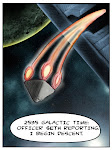




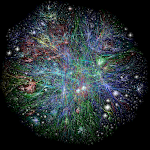
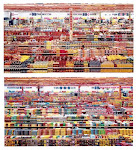


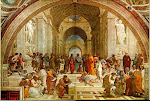


.gif)





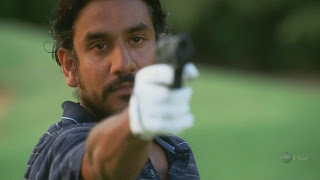

No comments:
Post a Comment